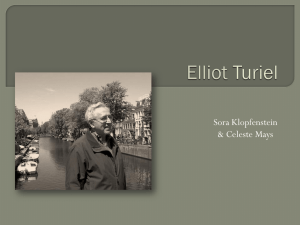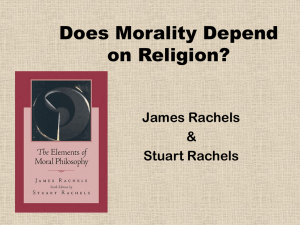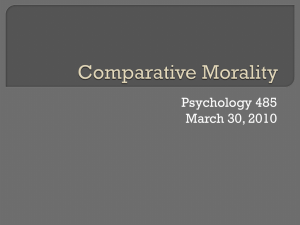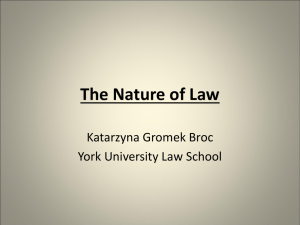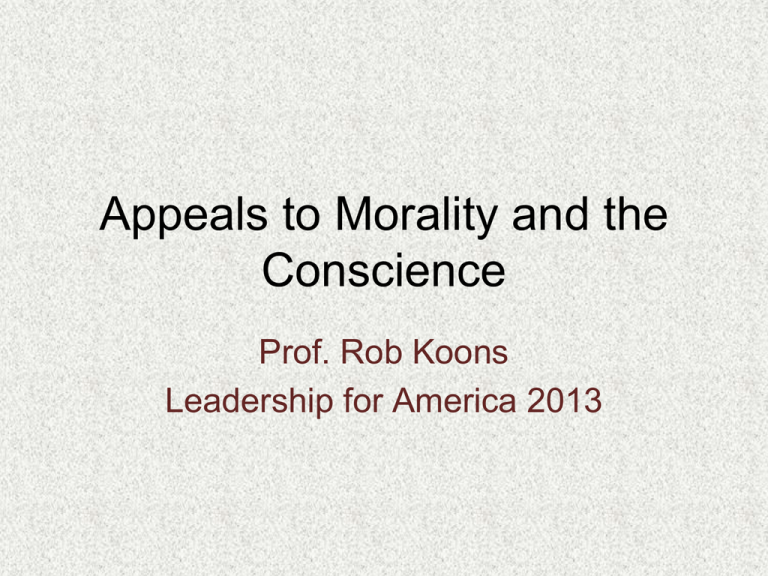
Appeals to Morality and the
Conscience
Prof. Rob Koons
Leadership for America 2013
The Authority of Conscience
• The conscience has an absolute authority -superior to that of any human being or
institution.
• Authority is personal in character.
• The principles of morality, represented by
the well-formed conscience, are eternal,
immutable and necessary.
Therefore, the conscience represents the
demands of an eternal, necessary and
immutably good person.
Blessed John Henry Newman
Cardinal Newman
(1801-1890), convert,
theologian, educator.
The Grammar of Assent
(1870) – focuses on the
role of conscience in
revealing God’s
existence.
John Henry Newman, An Essay in Aid of a
Grammar of Assent (1870), Chapter 5
Someone who recognizes his own conduct as immoral “has
a lively sense of responsibility and guilt, though the act be
no offence against society, -- of distress ad apprehension,
even though it be of present service to him, -- of
compunction and regret, though in itself it be most
pleasurable, -- of confusion of face, though it may have no
witnesses.” Such affections are ‘correlative with persons.”
“If, as is the case, we feel responsibility, are ashamed, are
frightened, at transgressing the voice of conscience, this
implies that there is One to whom we are responsible,
before whom we are ashamed, whose claims upon us we
fear.”
An Objection
In fact this argument faces a dilemma. If we take conscience at its face
value and accept as really valid what it asserts, we must say that there
is a rational prescriptivity about certain kinds of action in their own right:
that they are of this or that kind is in itself a reason for doing them or for
refraining from doing them. There is a to-be-done-ness or a not-to-bedone-ness involved in that kind of action in itself. If so, there is no need
to look beyond this to any supernatural person who commands or
forbids such action. Equally the regret, guilt, shame, and fear associated
with the consciousness of having done wrong, although normally such
feelings arise only in relations with persons, are in this special case
natural and appropriate [even in the absence of any God].
J. L. Mackie, The Miracle of Theism (1982), pp. 104-5.
Mackie’s Recommended Reply
We might well argue... that objective intrinsically prescriptive features,
supervening upon natural ones, constitute so odd a cluster of qualities
and relations that they are most unlikely to have arisen in the ordinary
course of events, without an all-powerful god to create them.
....if we are to explain an intrinsic to-be-done-ness or not-to-be-doneness which is not such a reflection or projection [of our purposiveness],
it is natural to take this as in injection into reality made by a universal
spirit, that is, something that has some analogue of human
purposiveness.
J. L. Mackie, The Miracle of Theism (1982), pp. 115-6
Mackie’s Argument
Theism is the best explanation of the existence of objective values.
1. Value-properties (objectively good/bad) “supervene” on natural
properties: once we've fixed the natural properties of a situation, the
evaluative aspects are also determined.
2. This necessary connection between values and their basis in nature
is mysterious. It can't be a logical, conceptual or “analytic” connection,
since value properties are intrinsically action-guiding, while natural
properties are not.
3. God as a purposive agent could perhaps create and impose objective
values on things -- since He is himself a purposive agent.
Peter Kreeft’s Analysis
We assume that conscience is a mode of knowledge, a way
of knowing certain objective moral facts.
What is the ultimate source of these facts? Four possible
answers:
1.Something abstract, like an idea or mathematical
object.
2.Something concrete but less than human – like an
animal instinct (the herd instinct, sympathy).
3.Something concrete but human – human conventions,
laws and institutions.
4.Something concrete but super-human – God.
Could Morality be Based on Abstract
Ideas?
• Where are any such ideas located? Best answer: in the
eternal Mind of God.
• Are moral ideas mere possibilities? How are they relevant
to the real world? What gives them authority over us?
• Do they exist only in the human mind? Again, what gives
them authority? What accounts for their universality?
• If they are not at all concrete (either material or mental),
how do we come to know them? Best answer: God
communicates them to us.
• The natural law in our mind is our participation in the
eternal law of God’s nature.
Could Morality be Mere Animal Instinct?
• Instincts lack the peculiar authority of morality. There is no
instinct that must always be “obeyed”.
• Saying that we should “obey instincts” is like saying we
should “obey people”. Instincts are in constant conflict
with each other. Morality (reason) stands above the
instincts, telling us which ones to follow and when.
• We don’t always follow the strongest instinct. We can act
in accordance with reason and knowledge.
• There is no instinct of conscience. We can know what the
right thing to do is even when we don’t feel like doing it.
Could Morality be Merely Human?
• This makes morality relative to our local culture, political
regime.
• Some regimes, cultures are morally bankrupt. Morality has
super-human authority. E.g., the rightness of resisting
tyranny, oppression.
• This relativism destroys the possibility of moral progress.
We could discover new moral truth.
• Why should other people have such authority over me,
simply because there are more of them?
Can We Reject the Objectivity of
Morality?
We could appeal to the fact that moral ideas vary from place
to place, from time to time.
People have the moral ideas largely because of what they
are taught to believe.
Evolution (natural selection) is the basis for some of our
moral ideas, but evolution doesn’t care about the absolute
truth of our thoughts, only about what maximizes the
chances of our genes to replicate themselves.
Objective moral facts don’t fit neatly into the natural world.
Simplest explanation: the objectivity of morality is just an
illusion
In Defense of the Objectivity of Morals
• Moral truths are as obvious as any “natural” truths: it is
wrong to torture children for fun.
• No one can give up belief in the objectivity of morals. As
rational beings, we cannot help but judge our actions and
the actions of others.
• Morality exists universally: all cultures at all times have
some sense of right/wrong, good/bad.
• In fact, all moral systems have a great deal of overlap:
don’t murder, don’t cheat or defraud, don’t seduce
others’ spouses, etc.
The Error of Subjectivism
• Some philosophers have defended the theory of
subjectivism, emotivism or expressivism.
• On this view, apparent assertions of moral truth are in
reality merely expressions of private feeling. “Murder is
wrong” means merely: “Murder, Boo!!”
• Two objections.
• This can’t explain the phenomenon of moral
disagreement.
• It can’t explain the meaningfulness of logically complex
moral assertions: “If murder is wrong, so is abortion.”
Robert M. Adams’s Theory of Moral
Right/Wrong
• Adams suggests that we reject the idea that ‘forbidden by
God’ gives the meaning or subjective content of our
concept of ‘moral wrongness’.
• Instead, we should take it as a quasi-scientific theory
about the real-world essence of moral wrongness.
• Analogy: the essence of water is ‘made of H2O
molecules’. However, this does not give the meaning of
‘water’. It was a scientific discovery, not a result of just
introspecting our own thoughts.
Evidence for the Divine-Command
Theory
If true, Adams’s Divine Command theory would explain the
following data about moral wrongness:
•Moral wrongness is an objective property of kinds of action.
•It depends on a super-human source.
•The things we normally take to be wrong (theft, murder,
adultery, etc.) are really wrong (forbidden by God).
•We can explain how we are able to know the moral facts
(God communicates moral truth to our conscience).
•Doing what is right leads to good things (a positive
relationship with God, friendship with God).
Adams’s Theistic Platonism:
God as The Good
• To be good (morally) is to resemble God, with
respect to one’s moral character.
• God is the perfect paradigm of moral goodness.
• Again, this theory accounts for the objectivity,
eternity and superhuman source of the standards
of moral goodness: love is good because God is
love.
Plato’s “Euthyphro” Problem
First posed in Plato’s dialogue with the title,
“Euthyphro” (who engages in dialogue with
Socrates).
Euthyphro proposes that the essence of “piety”
(moral or religious goodness) is: whatever is loved
by the gods.
Socrates presses the dilemma:
Does God love pious deeds because they are
pious?
Or, are they pious because God loves them?
Solution: The Simplicity of the Divine
Nature
It is God’s essential and eternal nature
(as Love) that is the ultimate standard
of goodness, not His “arbitrary” will.
Goodness is neither above God (as a
standard to which He must conform),
nor below God (as subject to His
arbitrary will) –
Goodness is God.
Dawkins’s Darwinian Account of
The Good Samaritan
Could it be that our Good Samaritan urges are misfirings, analogous to the misfiring of a
reed warbler's parental instincts when it works itself to the bone for a young cuckoo? An
even closer analogy is the human urge to adopt a child. I must rush to add that 'misfiring'
is intended only in a strictly Darwinian sense. It carries no suggestion of the perjorative.
The 'mistake' or 'by-product' idea, which I am espousing, works like this. Natural selection,
in ancestral times when we lived in small and stable bands like baboons, programmed into
our brains altruistic urges, alongside sexual urges, hunger urges, xenophobic urges and
so on... In ancestral times, we had the opportunity to be altruistic only towards close kin
and potential reciprocators. Nowadays, that restriction is no longer there, but the rule of
thumb persists. Why would it not? It is just like sexual desire. We can no more help
ourselves feeling pity when we see a weeping unfortunate (who is unrelated and unable to
reciprocate) than we can help ourselves feeling lust for a member of the opposite sex
(who may be infertile or otherwise unable to reproduce). Both are misfirings, Darwinian
mistakes: blessed, precious mistakes.
Richard Dawkins, The God Delusion (2006), p. 221
Objection: Moral People Don’t Need
God as Motive
If there is no God, why be good? Posed like that, the question sounds positively
ignoble. When a religious person puts it to me in this way (and many of them
do), my immediate temptation is to issue the following challenge: 'Do you really
mean to tell me that the only reason you try to be good is to gain God's approval
and reward, or to avoid his disapproval and punishment? That's not morality,
that's just sucking up, apple-polishing, looking over your shoulder at the great
surveillance camera in the sky, or the still small wiretap inside your head,
monitoring your every move, even your base thought.’
If you agree that, in the absence of God, you would commit robbery, rape, and
murder, you reveal yourself as an immoral person...
Richard Dawkins, The God Delusion (2006), pp. 226-7
We can Know what is Right/Wrong
Apart from Knowing God
It's wrong, God or no God, to torture little children just for the fun of it.
What basis we have for making that confident moral claim is another
thing, but we know, if we know anything, if we have any moral
understanding at all, that that is wrong. And moreover, to understand
what you're talking about, to understand that God, among other things,
is a being worthy of worship and that God is said to be perfect, the
perfect good, we need some logically prior understanding of those
normative concepts.
Kai Nielsen, “Ethics without God,” in Does God Exist? by J. P.
Moreland and Kai Neilsen, Prometheus Books, Amherst NY 1993. pp.
99-100
Christians Agree with the Critics Here
• It is possible for atheists to act morally. Doing the
right thing is a sufficient motive for action, even
when God is not acknowledged.
• It is possible to know right from wrong, apart from
any theological knowledge. The law of God is
“written on the heart” (Romans 4).
• Our point is that these two facts point to and
provide evidence for the existence of God, as the
best explanation of the ground of morality and
moral knowledge.
Argument from the Meaning of Human
Life
• Human life has a natural meaning and
purpose, which includes the attaining of
wisdom and moral perfection.
• The First Cause of human existence must
be have ordered human life to that end.
• So, God is the ground of morality.
It is self-defeating to suppose that human
life is meaningless, or that we create our
own meaning. Meaning cannot come from
meaninglessness.
Meaning apart from God?
In the first place, there can be purposes in life even if there is no
purpose to life. So, if God exists, you were made for a purpose. And that
itself poses problems about your autonomy... You have lots of
intentions, aims, goals, things that you care about, that, God or no God,
remain perfectly intact. If you love someone, whether there is a God or
not, that love can go on. It remains intact.
Kai Nielsen, “Ethics without God,” in Does God Exist? by J. P.
Moreland and Kai Neilsen, Prometheus Books, Amherst NY 1993. p.
104





